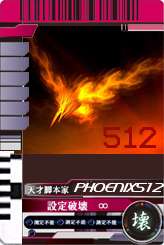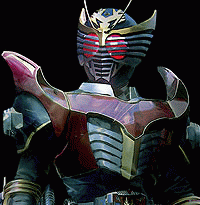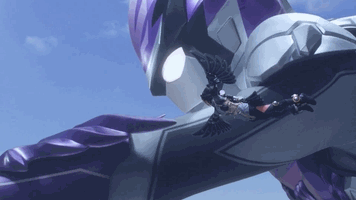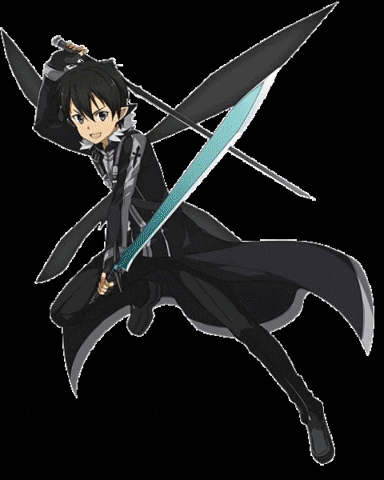Japanese honorifics (san, chan, kun, etc...)
- Phoenix512
- Rising to the Top

- Posts: 6810
- Joined: Tue Dec 11, 2007 4:29 pm
Re: Japanese honorifics (san, chan, kun, etc...)
First off, we did have the English translation of the attacks as a TL note first time they were introduced. The TL note wasn't semi-transparent in Shinkenger. The semi-transparent TL notes occurred in Decade and W. To me it seems that the attacks themselves are in English for most part in the last few years. Kamen Rider didn't really have Japanese attack names while in Sentai, every other year they tend to use Japanese attack names instead of English. I personally prefer to have the original Japanese name instead of an English that maybe unwieldy to say to the regular English speaker.
-
That Guy
- Save the life
- Posts: 2341
- Joined: Sat Dec 15, 2007 10:16 pm
- Favorite series: Gurren-Lagann
- 2nd Favorite Series: Shinkenger
- Dreamy: Ozu Urara
- Favorite Actor?: Hosokawa Shigeki
- Favorite Band: Disturbed
- Alignment: Neutral Good
- My boom: Gurren-Lagann
- Location: Georgia, US
Re: Japanese honorifics (san, chan, kun, etc...)
While I kind of like having the attacks untranslated, the fact that they sound wonky in English means they sound just as silly to someone who understands Japanese, so not translating them for cool factor is giving them more credit than they deserve.
- Magenta
- It's Time for Buster

- Posts: 599
- Joined: Sun Feb 15, 2009 9:21 am
- Favorite series: Fourze
- 2nd Favorite Series: Boukenger
- Dreamy: Nozama
- Favorite Actor?: Takehito Koyasu
- Favorite Band: 765 Productions
- Alignment: Chaotic Good
- My boom: Robots. Always.
Re: Japanese honorifics (san, chan, kun, etc...)
It's actually not like that, just because Japanese is a language that at it's very core is designed to be compounded in ways English often isn't. That and what sounds 'cool' differs between languages - 'Rider Kick' sounds really fucking stupid if you translate it into Japanese too.
ima sugu shutsudoukable
Re: Japanese honorifics (san, chan, kun, etc...)
Here is my two cents.
IMHO I like the honorifics including the -tachi left in because over all I believe that T-N does a very good job of not only translating but also using proper English and keeping the amount of words on the screen down. Some thing that most ppl for get is that in English "you guys" or "you all" is not proper only in other languages do they have words for you plural. Like in Spanish they have vosotos, French they have vous, and in Japanese they add -tachi to the word. If T-N was to "properly" translate every thing to English not only would it take up half the screen witch i see on some of the shows i watch on you-tube that ppl translate from German and Spanish but the phrasing actually wouldn't look right.
To give an example of what I mean just look at this image here,

All of this was on the screen for about 5 seconds and unless you a fast reader you're going to have to pause to read it all.
Now imagine that in a T-N sub just because "you all" (like i said now way to say this in English that sounds correct) want every little thing translated when it really does not translate well to English.
Seeing as I'm going to school to be a translator and have also done some playing around with subbing i do know a little bit about what I'm saying, but if you feel the need to disagree go ahead every one has there right to there own ideas.
IMHO I like the honorifics including the -tachi left in because over all I believe that T-N does a very good job of not only translating but also using proper English and keeping the amount of words on the screen down. Some thing that most ppl for get is that in English "you guys" or "you all" is not proper only in other languages do they have words for you plural. Like in Spanish they have vosotos, French they have vous, and in Japanese they add -tachi to the word. If T-N was to "properly" translate every thing to English not only would it take up half the screen witch i see on some of the shows i watch on you-tube that ppl translate from German and Spanish but the phrasing actually wouldn't look right.
To give an example of what I mean just look at this image here,

All of this was on the screen for about 5 seconds and unless you a fast reader you're going to have to pause to read it all.
Now imagine that in a T-N sub just because "you all" (like i said now way to say this in English that sounds correct) want every little thing translated when it really does not translate well to English.
Seeing as I'm going to school to be a translator and have also done some playing around with subbing i do know a little bit about what I'm saying, but if you feel the need to disagree go ahead every one has there right to there own ideas.
- gyozilla
- Kamen Knight
- Posts: 72
- Joined: Mon Sep 07, 2009 12:40 am
- Favorite series: WShinken555RyukiKuga
- 2nd Favorite Series: Den-O, Kikaider
- My boom: erang
- Location: soba ni iru
Re: Japanese honorifics (san, chan, kun, etc...)
I guess the argument is that, in the end it's supposed to be a translation (anything left behind for whatever valid reason is unfinished work), those things can be translated, and without much detriment to the end result. It's because the job/goal is translation, and you sometimes lose something even if the translation was "perfect", so to make an exception for honorifics when you've potentially lost something else in translation is basically lying to yourself. It's the idea that it becomes ironically contraditory that a person looking for a sub solution because he has little to zero knowledge of a language encounters some of the very things that were expected to be solved for him. So the guy's going "That's why I needed a sub in the first place! That's the point of a translation." Probably a bad analogy, but I guess the feeling's maybe like converting yen to US dollars, only the 100 yen coins won't be converted because they tell you that they hold important cultural significance, and you go "That's great and all, but I can't make any use of this" and they go "Tough, not my problem."Phoenix512 wrote:It's more about why some people don't like the honorifics are kept in the subs "as is" compared to something else. That's what I'm truly curious about.
From a pure idea standpoint, how easy it is to learn with some quick legend/chart, how much will be lost and undesirably gained from translating/dropping honorifics ("authenticity" or "missing out"), or how we should be free to consider the relationships for ourselves and not influenced by the translator's choices, aren't really the point. People are kidding themselves with the last notion if they think that the act of reading subtitles doesn't already mean that they're being influenced by all the translation choices that the translator has made. Since any translation is a substitute/go-between, expecting no influence imparted from it seems misguided. All a translation can strive for is to translate fully with as little deviation/influence as possible (if that is its prerogative). The argument is that as little influence as possible doesn't mean leaving original language stuff in either, because that's not translation. If people can recognize that change is inherent to translation, and change means you tend to lose something in translation, then people may realize that they have more important things to worry about losing than simply honorifics. Sometimes I'll notice that a sentence is inherently missing something, even if the mechanics of translation and wording are "perfect"; it makes me wanna go "You're worried about what now?" whenever people harangue about honorifics. They're almost a non-issue when you take into account the whole scope of whatever else you may be missing.
Like say with hmm, Tenka Touitsu ("united under providence") in Shinkenger. Some people may know it's more like "uniting everything under the heavens," but even if that is a perfectly valid translation, it's a loaded phrase that implies a deeper meaning of one's control over the world. To be able to bring all the factions under your command means your mastery over the world. So basically, it means you're the shit and your authority is unquestionable. And with Shinkenger's feudal motif, it plays up ShinkenOh as being royalty, because this phrase usually means you're the ruler of the world.
In any case, I'm just trying to help answer the posed question, I may not feel the same way as all the arguments.
well, I think the problem with this argument is assuming that translating "every little thing" automatically = cluster-f subtitle rape. That's just people doing it wrong.nekobouya wrote:If T-N was to "properly" translate every thing to English not only would it take up half the screen
...
Now imagine that in a T-N sub just because "you all" (like i said now way to say this in English that sounds correct) want every little thing translated when it really does not translate well to English.
As with some other examples in this thread, I think support for honorifics by showing how people are doing it wrong just seems to weaken the cause instead. The Umi-ster/Fuu-ster, nee-san becomes [name], last name subbed as first name (disrespectful), awkward phrasing, not how English speakers address each other, not translation friendly, etc. Those may be tragic but not conducive to how creativity and an adept translator can make it work. That is arguably, however, the elusive goal. I think translation in the end is more or less about what you are willing to compromise on or give up. The course TV-N has chosen is that translating honorifics is too much of a detriment/compromise, too much of a trade-off for what they want to do. The mind definitely does not like to hear "Nee-san" and read "Yuka" though.
Something I noticed recently is seeing the "Roadshow" translation for commercials for movies at the end of, say, a KR episode. Their usage of the term means "Premiere" or less so "First-run", whereas we tend to think of the word as a traveling/touring show. I mean, yes, it's more wasei-eigo that came from this, but using it now is kinda misleading.Lunagel wrote:I don't remember many instances of hearing "trump" in toku, except in Magiranger once. I don't think we've done it recently, but yeah, I can see where you might have a "WTF" momentArchon Divinus wrote:Related question: I know that the Japanese word for playing card is trump, which is an English loan word, but do you really have to leave it as trump when translating? Trump in English doesn't refer to cards in general, or as a whole, but usually to specific card in certain card games, and seeing playing cards called trumps in the translation is always a little jarring.
Re: Japanese honorifics (san, chan, kun, etc...)
A giant Japanese attack name is a lot more unwieldy to a regular English speaker than a weird English one.Phoenix512 wrote:First off, we did have the English translation of the attacks as a TL note first time they were introduced. The TL note wasn't semi-transparent in Shinkenger. The semi-transparent TL notes occurred in Decade and W. To me it seems that the attacks themselves are in English for most part in the last few years. Kamen Rider didn't really have Japanese attack names while in Sentai, every other year they tend to use Japanese attack names instead of English. I personally prefer to have the original Japanese name instead of an English that maybe unwieldy to say to the regular English speaker.
-
That Guy
- Save the life
- Posts: 2341
- Joined: Sat Dec 15, 2007 10:16 pm
- Favorite series: Gurren-Lagann
- 2nd Favorite Series: Shinkenger
- Dreamy: Ozu Urara
- Favorite Actor?: Hosokawa Shigeki
- Favorite Band: Disturbed
- Alignment: Neutral Good
- My boom: Gurren-Lagann
- Location: Georgia, US
Re: Japanese honorifics (san, chan, kun, etc...)
This.Uncontrol wrote:A giant Japanese attack name is a lot more unwieldy to a regular English speaker than a weird English one.
-
oddjob
- Humongous
- Posts: 481
- Joined: Thu Jul 17, 2008 6:48 pm
- Alignment: Lawful Neutral
- My boom: Ultraman Nexus
- Quote: "Giving up" is what kills people.
It is only when a person refuses to give up no matter what that they earn the right of walking down humanity's noble pathway.
Re: Japanese honorifics (san, chan, kun, etc...)
Ais posted this someplace else and I decided to post it here 
http://en.wikipedia.org/wiki/Japanese_honorific
Maybe that together with "HEY, YOU. YES, YOU, ASSHOLE. THIS IS WHAT ALL THESE FUCKING HONORIFICS MEAN:" would be a perfect splash!
http://en.wikipedia.org/wiki/Japanese_honorific
Maybe that together with "HEY, YOU. YES, YOU, ASSHOLE. THIS IS WHAT ALL THESE FUCKING HONORIFICS MEAN:" would be a perfect splash!
-
William_Duel
- Rank Gone due to timeline changes
- Posts: 808
- Joined: Sat Aug 09, 2008 10:29 pm
- Favorite series: Kamen Rider Kabuto
- 2nd Favorite Series: Kamen Rider Faiz
- Alignment: Neutral
- My boom: The World.
Re: Japanese honorifics (san, chan, kun, etc...)
Hm I'm gonna be that guy who says...I don't really care either way. I dunno, I don't give this issue much thought. Yes I do know what they all mean though who knows how I learned what they mean? Some of them I've learned from repetition and immersion and just plain old context. But I do think it helps to have notes. Even if not in the episode proper, perhaps the website could have a page dedicated to a translation of commonly used honorifics and untranslated words.
Also I think there is some interest to explaining Momotarou's catchphrase "Ore Sanjou!" because really it's a throwback to old samurai period dramas and showa era shows. So there is some missing cultural context there which is left unexplained. Well it's not absolutely vital that one needs to know that sort of stuff though and it's not like you'll use that phrase in an everyday Japanese setting...they might laugh at you.
Also I think there is some interest to explaining Momotarou's catchphrase "Ore Sanjou!" because really it's a throwback to old samurai period dramas and showa era shows. So there is some missing cultural context there which is left unexplained. Well it's not absolutely vital that one needs to know that sort of stuff though and it's not like you'll use that phrase in an everyday Japanese setting...they might laugh at you.

Soldat Veritas
- gantonis
- Sentai Senshi
- Posts: 25
- Joined: Fri Aug 06, 2010 2:35 am
- Favorite series: Super Sentai
- 2nd Favorite Series: Power Rangers
- Dreamy: Sazer Velsu
- Alignment: Lawful Good
- Location: Volos, Greece
- Contact:
Re: Japanese honorifics (san, chan, kun, etc...)
I want them, I don't have a problem with them. 
- takenoko
- Team Baron

- Posts: 36797
- Joined: Mon Dec 10, 2007 8:33 pm
- Gender: Toast
- Favorite series: All of them
- Alignment: Neutral
- My boom: stick
- Quote: <Lunagel> That's Toei's dumb fault
- Type: ISFJ Protector
- Location: Yami ni umare, yami ni kisu
- Contact:
Re: Japanese honorifics (san, chan, kun, etc...)
Yeah, sometimes stuff like that is even worse than just abandoning it completely. Like going halfway to acknowledge that there's a system of respect in Japanese culture, but using a filler English honorific that completely makes it sound more stilted in the localized version.
- hiro9796
- TQG

- Posts: 435
- Joined: Tue Nov 14, 2017 4:29 pm
- Favorite series: TOQger, Kamen Rider Zero One, Keisatsu Sentai PatRanger VS Kaitou Sentai LupinRanger
- 2nd Favorite Series: Kamen Rider Agito, W, Zero One
- Dreamy: Sinon (SAO), Megumin (Konosuba)
- Favorite Actor?: Endo Aya, Shimono Hiro
- Alignment: Lawful Good
- Quote: Ah le le!
Now, count up your sins!
By the power vested in us by the Global Police, we will deal with you by force!
There's only one person who can stop you, me! - Type: ISTJ Inspector
Re: Japanese honorifics (san, chan, kun, etc...)
Even though Persona English dub games keep (some) this honorrifics, it just sounded awkward mostly because of the speaking intonation , even more when they go by western order of first name last name order instead of keeping it last name first name order like Japanese does.












